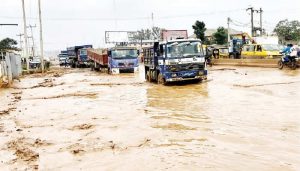Nigerians’ Greatest Nightmares

OpenLife Nigeria reports that beyond any shade of contradiction, Nigerians’ greatest nightmares are certainly not by travelling on the Abuja -Kaduna express road for fear of kidnappers but embarking on a journey on the Lagos -Abeokuta express road.
It is the equivalent of a journey to hell through Sahara desert.
The road, constructed and reconstructed by successive administrations beginning from pre independence era, is an 81-kilometre-long (50 mi) expressway connecting Abeokuta, the capital of Ogun State, and Ikeja, the capital of Lagos and ranks one of
Nigeria’s busiest highways. as inter-state and intra-city route, handling more than 250,000 PCUs daily.
The deplorable state of the expressway has continued to compound the woes of residents and business owners in the area.
At the moment, the road had collapsed.
Motorists and commuters are having hectic time plying the route.
The almost three-kilometre stretch of Joju, immediately after the Sango-Ota Bridge inward Ifo, has been abandoned.
The road is s dotted with large potholes lodged with water.
Both trucks and vehicles are forced to connect to the other lane, as they face oncoming vehicles only to connect back to their lane at the Igbala end of the road.
Motorists expressed fear that the available lane might soon get damaged due to the high volume of traffic in the axis.
It was also a similar sight at the Toll Gate end of the road, where the lane connecting motorists from Alakuko inward Ogun State, has also been abandoned.
Only a few vehicles manage to meander through the section of the road ridden with potholes.
A gully lodged with water could also be seen at the end of the axis.
Most of the motorists resort to plying one way, including police patrol vehicles and other military agencies.
There are sad incidences of vehicles driving against traffic knocking down commuters several times.
The deplorable condition of the road has also become an avenue for street urchins to extort money from commercial drivers.
The road has paralysed economic activities in the area including banking and manufacturing.
At least two filling stations and some other business outlets along the axis have been shut down.
A business owner, Abdullahi Sanusi, said, “We are tired of complaining. Almost all the businesses on this side of the road have been paralysed. We are only living by God’s grace. As you can see, I sell tiles, but my customers rarely patronise me these days. They prefer to buy somewhere close to their area whenever they think of the stress of coming here.”
A trader, Afolabi Lawal, who sells plank at a sawmill close to the Joju end of the road, said he had been experiencing low patronage.
He said, “Our sales have reduced in the past few months since the road got worse. There was a time vehicles were still managing the road, but not any longer since their vehicles started to break down.”
Motorists are also complaining bitterly about how the road has damaged their vehicles.
The supervisor in charge of the Lagos-Toll Gate section of the road, Wale Adebote, said the Federal Government has not abandoned the road.
He said, “We are coming back to the road. The problem we have in that area is that every space of land has been sold. Everywhere is fully developed and the water accumulated on that axis comes to the lowest point.
“But a redesign has been undertaken to take care of that problem. The contractor has been moved out of site, but they will soon come back. We aim to deliver the road by the end of the year, and that is what we are working on.”






